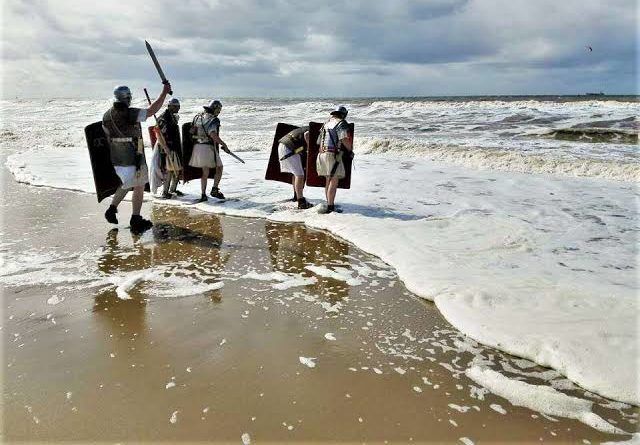littlebootsbeach
LITTLE BOOTS ON THE BEACH – HOW ORGANISATIONAL MORTALITY INVITES AUTOCRATIC CORRUPTION

“Losing a job in the modern healthcare industry is dangerous, especially if it pertains to insubordination or questioning any procedures.”
Caligula
After several unsuccessful military campaigns, Emperor Gaius was determined to claim a victory. He was the son of Germanicus, the famous general. Travelling with the army, he earned the nickname Caligula, “little boots,” from soldiers apparently amused by the child-sized suit of armour in which his parents dressed him (Woods, 2000). In desperation over the lack of victories and believing himself divine, he named his enemy Neptune, the god of the seas. This is akin to blaming the fields of mathematics for failure of people to understand them or blaming nature for a virus after spending fortunes on gain-of-function research (Lerner et al., 2021).
His enemy firmly established, Caligula’s next military foray was on a beach, or *against* a beach as it was in actuality. He ordered his entire army to line up on the beach. These soldiers did as ordered. An army has an excellent reason for absolute autocracy within its ranks. It was easier to lose a head against enemies when out of lockstep with fellow soldiers. Therefore, it is true, soldiers follow orders, at least the living and successful ones. The profession requires unerring compliance.
Insubordination
Do soldiers also comb the sands for seashells instead of plunder when ordered to do so? They did, under Caligula’s command, exactly as told (Woods, 2000). None of those soldiers wished to incur his infamous wrath. Contradicting the mad emperor is a bad career decision for any soldier. It meant an ignoble death for him. Worse still, it could curse his family with unending calamity and, very likely, also death.
For my own experience in healthcare, asking questions of any kind is discouraged, even if and perhaps especially with an advanced degree. I emailed a hospital executive, who was also a medical doctor, regarding vaccination policy. Specifically, I wanted to know why medical personnel did not ask patients if they already had COVID-19 before advising vaccination. I provided him evidence that the adverse reactions were far more likely in such cases (Joshi et al., 2021). I was curtly told the policy was to follow orders verbatim from the CDC (the American “Centres for Disease Control”). During the same period, I responded privately to an email sent to all employees from a major government health department head, my boss. I suggested that he not downplay VAERS (Vaccine Adverse Event Reporting System of the CDC) adverse reaction statistics, as he had been doing, and suggested his promotion of a controversial medicine can have major consequences for his employees. Again, I was ignored and patronised. I lost my job within four months.
Losing a job in the modern healthcare industry is dangerous, especially if it pertains to insubordination or questioning any procedures. Careers involving high degrees of mortality generate hostile and threatening industries from an employee standpoint. These industries rely on a workforce filtered for compliance. These professions require people who will not question authority. Healthcare institutions organise members beyond their individual determination, judgement, and best interests for the mission, a greater good.

Compliance and Conspiracy
Large organisations in these high mortality industries naturally gravitate into unipolar structures. This cannot be claimed beneficial due to efficiencies of autocracy in these dynamics, as might be said for military throughout history and civilisation. Advantages notwithstanding, the rank and file are silent partners, filtered as they are for compliance. They give little input on structure beyond their immediate station for fear of the blacklist in their trade.
Caligula’s reign only lasted for four years, however he nearly brought the Empire to ruin. The reason he did not rule for longer was likely to do with his ever-expanding list of enemies. Without provocation, he would attack, rape, and murder citizens. The Romans were forced to witness this all and they could do nothing to stop it. Foreign dignitaries and officials were executed without charges, trials, or warning. When his assassination finally happened, it was brutal and understandably passionate for many of the participants.
When investigating organised criminal activities in such environments, there is no need to seek additional traces of conspiracy as the most important mechanisms are already incorporated. In tightly controlled environments with forced compliance, such as with armies and medical facilities, a criminal case should only require establishing connections between a bad order and the malevolent intentions. The notion of a scope limit on conspiratorial interests in leadership of large tightly-controlled organisations is absurd, as theorised (Grimes, 2016).
Groups lobbying for greater centralisation in such industries use the potential for increased mortality as a formidable foil against which to rail. The problems with such efforts are lack of evidence for definite benefits and disregard for institutional risks of vertical alignment. The potential for damage from this risk is so extreme, as to negate almost any argument from efficiency.

Discourse
There are likely no simple answers to this problem. A discourse should begin on to how this institutional weakness for corruption is best alleviated. This is of most especial importance for the practice of trustworthy medicine. I will end the article with possible topics:
- Basic limits on leadership and medical domain authority
- Optimal organisational structures given various medical criteria
- Governmental and business relationships in the practice of medicine
- Methods of identifying and promoting critically talented individuals
- Institutional ownership and stakeholdership
- Overhaul of medical business practices
- Multi-domain emergency analysis and planning
“When investigating organised criminal activities in such environments, there is no need to seek additional traces of conspiracy as the most important mechanisms are already incorporated. “
References
Grimes, D. R. (2016). On the Viability of Conspiratorial Beliefs. PloS One, 11(1), e0147905. https://doi.org/10.1371/journal.pone.0147905
Joshi, R. K., Muralidharan, C. G., Gulati, D. S., Mopagar, V., Dev, J. K., Kuthe, S., Rather, A. A., & Sahoo, A. K. (2021). Higher incidence of reported adverse events following immunisation (AEFI) after first dose of COVID-19 vaccine among previously infected health care workers. Medical Journal, Armed Forces India, 77(Suppl 2), S505–S507. https://doi.org/10.1016/j.mjafi.2021.05.011
Lerner, S., Hvistendahl, M., & Hibbett, M. (2021). NIH Documents Provide New Evidence U.S. Funded Gain-of-Function Research in Wuhan. The Intercept.
Woods, D. (2000). Caligula’s Seashells. Greece & Rome, 47(1), 80–87. http://www.jstor.org/stable/826949
